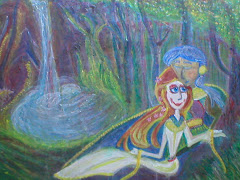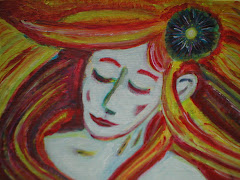The next stanza continues the theme of the hymn, and once again we lack any text in the original jibber-jabber.
Lwó
Ten
Kuifhakarulufhàngikuis[1]
Ker khleî ker kóm
Xaneuneuyeîtlho xhnoe
Xhrir swèfhen keis oâs jhpepayèxhyeu?
Íjas qitlhinokhéqii kintheyaqwayèpyer
Khwaitlhùweni stapiyàthnem kei
Xhnoe fhenuiqráru khnónutya xaneûneu.
Xhnípeyupwartùnyie
Thóqàyejikh tepoyepyer
Pajèwtsofha qé
Pàjexoar qé.
Pajeyaqwànita pú jhongopaingateqha.
Xiêxhmener xhnoike fhérmeu!
Tíngapi qlúsaloi khniijujaxhmiyaîpoit
Xeméqyiyi samaraûntu pfhu xaneûneu xhroe
Tepoyant pus qteî lyaêrs aqhus fhteî xhuîrmanoim.
Why are there so much,
So many hymns of joy
About rainbows and
About the dreams that are upon the other sides?
Iridules are dreams that are glossopoeisis, but
They are dreams that are merely glamour
And rainbows hide nothing at all.
So ye and I, the dear ones
Were once told, and
Persons choose
To believe hit.
I gnow that, pardon me, they are ignorant.
Humbly wait, and look on in wonder!
Some day from now ye and I dearly and humbly are fated on purpose to find the elegant thing, the matrix of rainbows,
we who are loving sweethearts and dreaming elegant seekers.
Pajejhyèlta qìr xhré xhyus
Xhnípe tlheuxhayulkhayòntet xhnèxhyer
Khòrnatuir xhnípèyatser fháyayùlkha
Qir Kheîlel kei?
Qyèkhrema’ eixhrejor qé qlúsèpyer
Xoâr eixhrejor qé qlús
Xhnoike fhérmeu xhnoike
Kei ker páyayot
Qir tìrxho fhiîn xhroe
Khyeunujoxaîreu!
Xhaisèntu kóm xhyeis
Pwíyampúmatèxhyeu tepoxhrejor
Stèlwe keiyaxhwa?
Eiqhorkhmipajeqyèkhren khnan
Xhyeis khyaê khnan?
Tíngapi qlúsaloi khniijujaxhmiyaîpoit
Xeméqyiyi samaraûntu pfhu xaneûneu xhroe
Tepoyant pus qteî lyaêrs aqhus fhteî xhuîrmanoim.
Who in the past chanted that
All wishes were both heard and answer’d
When they are invoked
Upon Kheîlel?
Somewiht thunk of hit, and
Somewiht believed it
And look in wonder and
Gaze in wonder upon it, done
Until now!
What is so an astounded delight
That it indeed forces you and me, the dear ones
To be star-gazing?
Natheless what do ye and I, the dear ones
Humbly think
We shall xyst?
Some day from now ye and I dearly and humbly are fated on purpose to find the elegant thing, the matrix of rainbows,
we who are loving sweethearts and dreaming elegant seekers.
Qhártse khnanuxhwi
Koaqing xhmafhromòrnamet.
Pyákhepe’ eixhrejor khnan
Pexeyìthni jau kei.
Toaqe tyukhurayèjhyi tú khréxhye taê tú?
Tlheûxha xamliyòjhwa túxhli khréxhye taê tú?
Jetlheûxha tlhìfhaya qhìyoment pótlhi qìr xhré póxhli.
Íjuyòntrin fháyayapònya lrainèlpa xhroe tírn kae keixhli khréxhye?
Khuîn eîying xhmoe xamlimèqras xhmoe.
Tlheûxha’ eixhrejor
Xhajhya qir tyíyèmfhoi kóm pú
Tlheusèxhyeu’ eixhrejor
Fhèjheru púxhni.
Ei qlús xhmoe kus fhongújo púxhmi keixing xhmoe.
Tíngapi qlúsaloi khniijujaxhmiyaîpoit
Xeméqyiyi samaraûntu pfhu xaneûneu xhroe
Tepoyant pus qteî lyaêrs aqhus fhteî xhuîrmanoim.
Fhwa fhwa fhwa fhwa fhwa fhwa
Lwa lwa lwa fhwa fhwa fhwa lwa.
All of ye and I are dearly ensorcelled
In its gospel.
Ye and I dear ones know that
It’s certainly magic and words, probably.
You are a little asleep, ye?
Do you hear voices, ye?
I, the dear one, have humbly heard those who call my dear names. Does it chance to be the sweet sound that perchance calls the young æronauts?
The voice may behave as the one identical thing.
I’ve heard it
So many times
That
I must pay attention to it.
It acts as somewhat that is beholdenness unto me.
Some day from now ye and I dearly and humbly are fated on purpose to find the elegant thing, the matrix of rainbows,
we who are loving sweethearts and dreaming elegant seekers.
Laa, da daa dee da daa daa,
La laa la la laa dee daa doo …
Personally I think that this is also a battle hymn, but I shall let the learned and the Wise and thou debate it. The least I can do is just list the words used herein. We have aqwànita those who gnow, wot a fact, a thing and eîying those who are ilke, identical and fháya, fhámat those who call, invoke someone or something and fhérmeu Lo! Look in wonder!, and that is an extra irrealis form for the participle fhérm and fhiîn those who are in the present, contemporary, nunow and fhongújo obligation, beholdenness, obligations to family, clan, Emperor and fhteî, fhteîmat those who dream someone or something, and it is also one of the names for Raven, rendered as Dreamer and íjas dreams and íju sound; those who hear someone or something and jhèpa those who are other, strange and jhyèlta those who chant, speak, say someone or something and kàrul, psongs of joy, hymns, a word we know from my younger sibling Karuláta and khuîn one thing, a single thing, singularity, unity, tik and khwaitlhùweni dreams and khyaê those who see, zyxt someone or something, one of those fun little irregular participles that you like so much, its object remains in the experiencer case and preceeds the participle, and in a similar vein we have the irregular participle khyeunujóxai or in this case the irregular irrealis khyeunujoxaîreu Lo! Look with wonder! Gaze in wonder! and it also takes the experiencer case with inverted word order, and we also have the words kìnthe, kinánthe which means rainbows, ayauhcozamalotl, Khnoqwísi’s necklace, iridules, rainbows as primordial elements ond hylen, cuycha, kaneveden, akainik, lömöb, mirriyhini, ĉielarkoj, gagilbara, yamani, qentha and lrainèlpa sailors, æronauts, gaganayaatrikaH, nafel, mee hearties (sea, sky, space), jEnbydwu, skaihan, scilmiol and lyaêrs darling, sweetheart, dearheart, fangheart, lesnan, pleasure, list, acushla, a cuisle, gëlod, jiladal, jilöfäbil, jilöfal, ladan, karuloj, karulinoj, dolĉuloj, dolĉulinoj, rud’u, urpi and oâs side of someone or something and páya, páyayot those who are done, finished, dumfungled, srēk, srīk, and this can be used as a periphrastic for the perfect aspect, and pèxe natural magick, magick ond language, magick ond words, mahō, asmigintza, sorginkeria, draoidheachd, elvertrolddom, pharmakeíā and pwíyàmpu, pwíyampúmat those who keep someone or something, force someone or something to remain and qhártse those who are ensorcelled, under a spell or story of a mage or Emperor, and I know that you’ll mention that this particular participle can be used in the Ensuring Construction such as qhártse’ ur qoe X Y to wit Y ensorcells X, Y puts X under a spell and qitlhinokhéqii visions, revelries, daydreams, gloßopoeisis, dreaming language, revelries of nature, theophany, revoj and qlús some persons, some things and qráru those who conceal, hide someone or something and qteî one of the many words we have in language for those who love someone or something and qyèkhren, qyèkhrema those who think someone or something and sàmaraun, samaraûntu webs, cobwebs, connexions, matrices, goßamer, spuled, coppeweb, dvergsnät, kavelo and stàpi illusions, glamour, dwimmerlaik and stèlwe those who behold Stars, are Star-gazren, Star-watchren and swèfhen, swèfhin yet another word for dreams, swevens, ndoto, yiviOs, lalfi; crystalline avian dreams sent by Akhlísa and thóqa, thoqelínge those who chant, reply, say, tell someone or something and tíngapi days now, from now, one’s Starday in the present and future and tírn, tìrnot those who are young, youthful and tlheûs those who turn to someone or something, pay attention to someone or something and tlheûxha those who hear someone or something and tuîr wish, hope and Tyùkhura Sleep and also a name for Raven Marghvran, nybikEos, the Immortal, the Trickster, and ujàxhmi those who find, discover someone or something and wtsòfha those who choose someone or something and xàmli, xàmlim voices and xaneûneu another word for rainbows, thy Mother’s necklace, and xeméqya the ergative plural form of the word meaning remnembered, elegant, eggsepciounal non·sentient inanimate beings, wihts such as things, places, abstracciouns, dead body parts, island planets ond suns ond moons as nature, corpses, living ships, scurrying rocks, whispering whispering mountains, and it’s other principle parts are xeméqyi, xeméqyeu, xeméqyaya, xeméqyiyi and xeméqyeûyeu, and we have the word xhaîsen, xhaisèntu amazement, astonishment, awe, wonder, astounded delight and xhamàfhromorn, xhmafhromòrnamet gospels, magical spells, incantations, apotropaick spells and xhmèner those who wait for someone or something and xhnèxhyer those who answer and xhuîrmen the ergative plural form of the participle meaning remnembered, elegant, eggsepciounal researchren, mad scientists, searchren, seekren, and its other principle parts are xhuîrma, xhuîrmoim, xhuîrmot, xhuîrmana, xhuîrmanoim, and finally xoâr those who believe, hold someone or something as true.
[1] The Rainbow Connexion. By Paul Williams and Kenneth Ascher. Performed by Kermit the Frog










